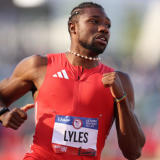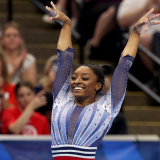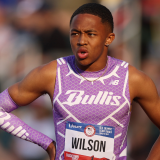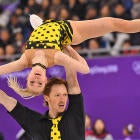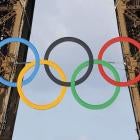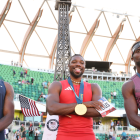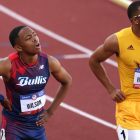Whether you need a refresher on all the sports on display in the 2018 Winter Olympics, or want to know what's the deal wit this country OAR everyone is talking about, this is the place for you.The Winter Olympics are a can't-miss extravaganza of some of the world's best athletes that comes around every four years. But let's be honest: four years is a long time to keep everything you need to know fresh in your brain.
Right here, we've got everything you need to know about the 2018 Olympics -- answers to all the questions you have, all the questions you think you have, and all the questions you should have regarding South Korea's Winter Games:
Where are the 2018 Winter Olympics?
Great place to start. This year's international competition will be held in Pyeongchang, South Korea.
Located just over 100 miles from Seoul, Pyeongchang is actually a county in a northeastern province of South Korea. Seoul is the nation's capital and the home of the 1988 Summer Olympics. Pyeongchang has a population of about 43,000, and its local claim to fame is its average elevation of 700 meters, which apparently offers residents "one of the best places for health, rest and sports in the world."
Side note: You'll see a lot of logos that stylize Pyeongchang as "PyeongChang," with an upper-case "C," but the county officially has only the "P" capitalized. Get ready for a nightmare of misspellings.
For those of you who aren't fluent in Korean, that's PYUNG-CHUNG.
When are the Olympics?
The entire slate of Winter Games competition will be broadcast across various NBC platforms from Feb. 8-25, with some curling and the Opening Ceremony coming first. (Note: The ceremony will actually be seen Friday, Feb. 9, at 6 a.m. Eastern -- or at 8 p.m., replayed -- for those watching in the United States.)
If you're talking times specifically, you'll want to note that, since the Olympics will be broadcast live from South Korea, there will be a 14-hour difference between local time and Eastern time. Here's the full breakdown of time differences:
Eastern time: 14 hours
Central time: 15 hours
Mountain time: 16 hours
Pacific time: 17 hours
Pyeongchang time is also ahead of all those time zones, so if NBC is broadcasting live at 8 p.m. ET, that means it is actually 10 a.m. the following day in Pyeongchang. An event broadcast live at 8 a.m. ET, meanwhile, would actually be a 10 p.m. event in South Korea.
How can I watch the Olympics?
If you're planning on watching live, the first thing you can do is make sure to clock some nap time during the afternoon.
In all seriousness, we've got an entire breakdown of how to watch the 2018 Winter Games right here at CBSSports.com, but here's the gist of your options for tuning in:
- You can watch on TV, where NBC, NBCSN, CNBC and USA Network will share live programming, including prime-time coverage
- You can watch online at NBCOlympics.com, on the NBC Sports app or through fuboTV, which you can try for free
What happens at the Opening Ceremony?
Traditionally, the ceremony, which marks the official beginning of the Olympics, includes:
- The Parade of Nations, in which participating athletes march alongside other representatives of their country
- Speeches from the International Olympic Committee and the Olympic Organizing Committee
- The Olympic Flame, usually lit with a torch by a prominent local athlete and kept burning until the end of the Games
- The raising of the Olympic flag
- A symbolic release of doves, which dates back to ancient Games as a method of signaling a country's victory
The Opening Ceremony is also best known for serving as a platform for the host city/area's culture. Being that the 2018 Olympics are in South Korea, reports suggest we could be in for some K-pop performances, but the most prominent sight could be North and South Korea jointly marching together -- a union that some aren't too keen on but represents a historic partnership between the neighboring nations.
So what's the deal with Russia?
Hey, up until this week, we were still trying to figure this one out, too.
Two years after more than 100 of their athletes were banned from the 2016 Rio Games as a result of performance-enhancing drug use at the 2014 Winter Olympics in Sochi, we know that Russia has officially been barred from participation in the Pyeongchang Games after a deeper investigation into a "state-backed doping program." That means, no matter what, the International Olympic Committee will never, ever attribute any Russian accomplishments at the 2018 Games to Russia. The country's medal count from South Korea will always, at least on paper, be zero.

What we didn't know entering this week was just how many Russian athletes would still be attending the Winter Olympics thanks to "special dispensation" from the IOC. Again, they won't be permitted to earn Russia any medals, and they'll also be required to compete in neutral uniforms, but more than 165 athletes from Russia are set to compete in South Korea. That total comes after the IOC rejected a request to allow 15 additional Russians, who were previously among more than 40 issued lifetime Olympic bans, to partake in this year's Games.
Still with us? Let's recap in simpler terms: Russia was caught cheating and they won't be represented as a nation at the Games, but they will be sending plenty of athletes, who will compete under neutral colors. Oh, and Vladimir Putin probably isn't happy.
Is anyone else not going to the Olympics?
Technically, everyone else is headed to Pyeongchang, but that doesn't mean certain countries didn't consider staying home, and when we say "certain countries," we mean the United States.
At one point, the U.S. ambassador to the United Nations said it was an "open question" as to whether Team USA would even show up in South Korea because of tensions with the nation's neighbor, North Korea. And Sen. Lindsey Graham later said he was confident the U.S. would outright boycott the Winter Games if North Korea showed up.
President Donald Trump has since called for a safe trip by Team USA to the Olympics, although Vice President Mike Pence may very well be sending a different message when he attends the Opening Ceremony looking to "disrupt North Korea's charm."
Does North Korea pose a threat to the Olympics?
The U.S. might like you to think so, and that's no surprise considering Trump and North Korea have gone back and forth with threats centered on nuclear warfare and missile testing. In fact, those very geopolitical disputes are a big reason why Olympic ticket sales and travel interest were initially reported as being "very low."

But South Korea is also doing its best to alleviate concerns, both uniting with its neighbor for the Opening Ceremony march, competing alongside North Korea in women's ice hockey and, of course, preparing for any unforeseen terrorist attacks with emergency defense drills and at least 5,000 armed troops worth of security.
The real worrisome question, outside of whether a norovirus outbreak will wipe out more security guards, might be ...
What's the weather supposed to be like?
Freezing. AccuWeather says Pyeongchang is the Earth's coldest location for its latitude, NBC News reports that hypothermia could set in after as few 45 minutes outside, and USA Today projects that single-digit temperatures could make the 2018 Winter Games the coldest, most wintry since 1994, when Norway hosted the Olympics.
At least Team USA will have self-warming Opening Ceremony uniforms.
Are NHL players really not going?
Much to the chagrin of ice hockey fans worldwide, the NHL is, in fact, preventing its players from competing in Pyeongchang. Team USA and other international teams have been forced to craft rosters without the help of NHL talent after league commissioner Gary Bettman made it clear in April 2017 that his teams would not be permitted to send players overseas.

Convenience played a part in Bettman emphatically refusing to break up the 2017-18 NHL season and honor the wishes of Olympic enthusiasts like Alex Ovechkin and Connor McDavid, both of whom are still prominent faces of the league, but the ultimate deciding factor was, presumably, money:
Simply put, paying for players to travel to South Korea and then compete in games that may result in injury and, thus, impact the NHL's own teams, all while a North American audience holds a rather lukewarm interest in the Pyeongchang Games, was too much of a financial gamble for league executives.
So who is going to the Olympics?
Finally, a question that allows us to look forward and embrace the Games: Who are the big names set to compete in South Korea?
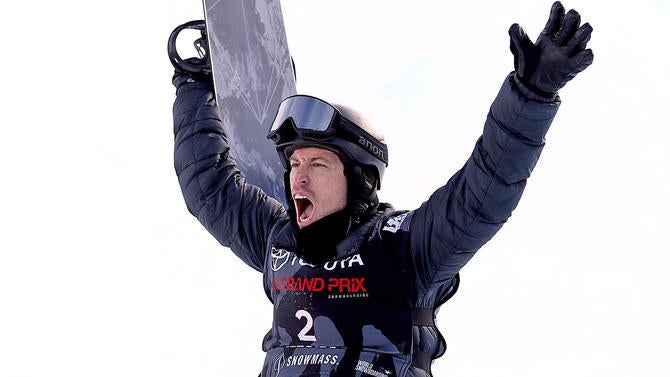
Thankfully for you, our own J. Darin Darst assembled an entire slideshow of American athletes to watch, but here's a quick look at some of the top Team USA names you'll be watching in Pyeongchang:
- Shaun White, snowboarding: A two-time gold-medal winner, he's back after a disappointing 2014
- Lindsey Vonn, alpine skiing: The best female at her sport of all time, she's trying to win again at 33
- Mikaela Shiffrin, alpine skiing: She became the youngest slalom champion in Olympic history in 2014
- Maame Biney, speedskating: She's only 17 and is the second person born in Ghana to ever represent Team USA
- Chloe Kim, snowbarding: A Winter X Games star, she's only 17 and looking for her first Olympic medal
- Brian Gionta, men's ice hockey: A former NHL veteran, he headlines the NHL-less team
- Ted Ligety, alpine skiing: A phenom back in 2006, he's vying for a third gold
Are there any new teams or countries going?
There sure are. Six different nations -- Ecuador, Eritrea, Kosovo, Malaysia, Nigeria and Singapore -- will make their Winter Olympics debut in South Korea, bringing the running total of competing countries to 92.

A couple of other firsts for Pyeongchang: Twenty-five years after "Cool Runnings" told the story of Jamaica's first-ever Olympic bobsled team, the country will be sending women's bobsledders to the Games for the first time. Nigeria, meanwhile, is also sending a bobsledding team, with their three female athletes becoming the first Africans -- men or women -- to qualify for the sport.
Just as a refresher, what are all the Winter Olympics sports?
No need to be embarrassed. We all need a refresher sometimes. Here's the complete list of sports at the 2018 Winter Games:
- Alpine skiing
- Biathlon (cross-country skiing and rifle shooting)
- Bobsledding
- Cross-country skiing
- Curling
- Figure skating
- Freestyle skiing
- Ice hockey
- Luge
- Nordic combined (cross-country skiing and ski jumping)
- Short track speedskating
- Skeleton sledding
- Ski jumping
- Snowboarding
- Speedskating
What else is important to know?
Beyond your sleep schedule for the overnight TV lineup, there's not a whole lot else you should know from a Team USA perspective, assuming you've already pored into our slideshow of big-name American athletes and checked out our guide of what to watch. But here's a few random facts just for the heck of it:
- Thirteen different venues will be used at the Pyeongchang Games, per CNN
- NBC's live broadcast marks the first time people in all U.S. time zones will have access to non-taped events
- A record 102 medals are up for grabs
- Pyeongchang was the runner-up to host both the 2010 and 2014 Winter Olympics
- This is the first time more than one athlete from Mexico has qualified
Now get ready to go watch these Olympics!



